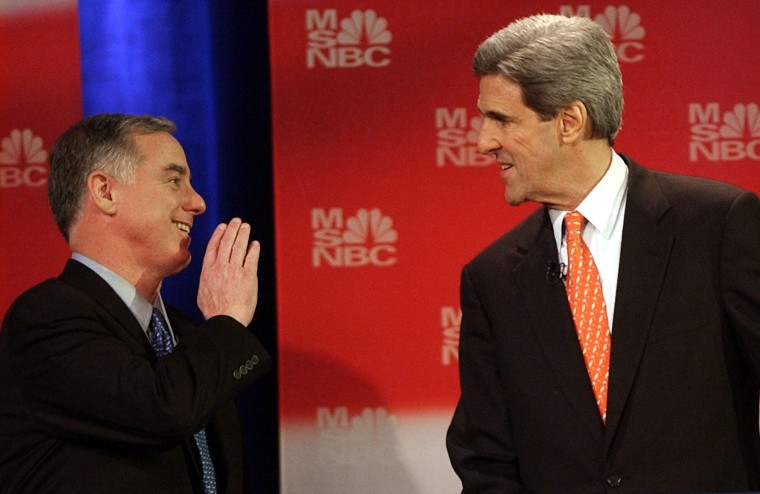Despite the impending Super Bowl, what Howard Dean needed to do in Thursday night’s debate on MSNBC was something best described in baseball terms: fire brush-back pitches at front-runner Massachusetts Sen. John Kerry, then finish him off with a curveball for a strikeout.
Dean did throw a couple of pitches in the general vicinity of Kerry’s head, but never forced him to hit the dirt. In one case, he even gave Kerry time to get out of the way. The senator ended the night with his uniform mostly clean and un-mussed.
A thankless task
Admittedly Dean had a thankless task — how to “go negative” without appearing to go negative.
According to some Dean supporters, it was Dean’s negative ad attack on Rep. Dick Gephardt in the week before the Iowa caucuses that repelled many Iowa Democrats and drove them to support Kerry and North Carolina Sen. John Edwards.
During a mostly sedate 90-minute debate on MSNBC, which Dean himself described during an off-camera break as “so mellow,” the former Vermont governor first said Kerry had served for 19 years in the Senate and had precious little to show for his time there, having “sponsored 11 bills that had anything to do with health care and not one of them passed. If you want a president that is going to get results, I suggest you look at somebody who did get results in my state.”
But Dean sidestepped the question from moderator Tom Brokaw on the ever-increasing cost of the Medicare and Social Security entitlements, which now consume 35 percent of the federal budget.
America could grow its way out of the impending entitlement crunch, Dean said. “Bill Clinton showed that when you improve the economy and get people jobs, then you increase payroll taxes and you make these funds more solvent.”
In his response, Kerry mildly said, “One of the things you need to know as president is how things work in Congress if you want to get things done.”
With self-effacement, Kerry pointed out that senators often get their own legislative ideas passed by attaching them to other senators’ bills. He claimed partial credit for the 1993 family and medical leave requirement and for bills to help those with AIDS and those made sick by Agent Orange.
With a substantial lead in the polls in states such as Arizona, which hold their primaries next Tuesday, Kerry perhaps felt he could afford to be modest.
Polite warning
A few minutes later, Dean once again fired one at Kerry, but gave polite warning. “I want to take a run at Sen. Kerry, give him another rebuttal opportunity,” Dean said.
“He claimed credit for the mental health care parity bill and for helping children get health care. Well, in South Carolina, there’s 102,000 kids with no health care. Do you have mental health care parity? Because if you were in my state, you would. And I don’t think what Sen. Kerry was talking about has been very much help for the people of South Carolina or any place else. With me you’ll get results because I’m a governor and I’ve done it and with Washington no matter what they say it never seems to trickle down to the people of South Carolina.”
Kerry again mildly shrugged off Dean’s remark saying, “We can set a better agenda on the national level than this president is willing to.”
Kerry seems to have already fixed his sights on President Bush and nothing Dean did during the debate caused Kerry to shift his fire back to the former front-runner.
Dean's Washington insider
Had Kerry needed his own brush-back pitch to fire at Dean, he could have borrowed one from Brokaw, who called Dean’s new campaign “CEO,” former Al Gore aide and telecom industry lobbyist Roy Neel, “a quintessential Washington insider.”
Dean, like most of the other Democratic presidential contenders, has vowed to go on a crusade against insidious Washington insiders and lobbyists.
Dean’s defense: simply deny that Neel was a lobbyist.
Neel “never lobbied and kept faith with his ethics pledge,” Dean asserted.
But as news accounts from the late 1990s show, Neel had a $600,000-a-year job with the United States Telephone Association, representing firms such as Verizon Communications and SBC Communications.
Los Angeles Times story
A Feb. 2000 Los Angeles Times story described Neel as “a highly paid telecommunications lobbyist."
The story noted that “alliances between political leaders and lobbyists are as common as marble colonnades in Washington, where people often work in the public sector for years, then cash in with private clients willing to pay generously for access and insights into government decision-making.”
The story then quotes Neel who explains, "It happens in this town. There is nothing illegal or untoward about it."
Neel, who had served in the Clinton White house, abided by a five-year ban on direct lobbying of his former White House colleagues.
But according to a 1999 Washington Post story, Neel “lobbies administration officials on behalf of phone companies even as he continues to advise the vice president and his staff on telecommunications policy and conduct special projects' for the Gore campaign.”
